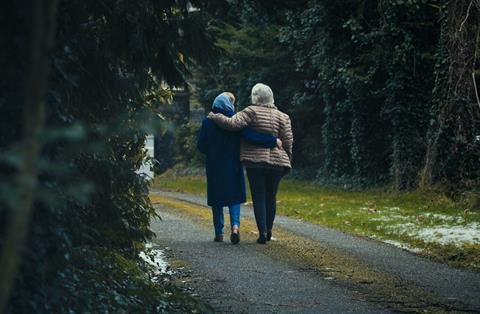Documentarian Sinead O’Shea explores the difficult history of Ireland’s religious abuses

Dir/scr: Sinead O’Shea. Ireland. 2022. 81mins
Sinead O’Shea pulls no punches in her latest documentary Pray For Our Sinners. Returning to her hometown of Navan, near Dublin, she confronts the legacy of an Ireland in which church and state were once an inextricably linked, all-powerful alliance. There are heartrending tales of those who suffered at the hands of the Catholic Church balanced by a celebration of the few who resisted an unquestioning conformity to the status quo. The moving personal testimonies and human interest should ensure a responsive audience at festivals and beyond, following its berths at Toronto and Telluride.
O’Shea is a sympathetic, sensitive interviewer, and her quiet persistence is rewarded
O’Shea, the director of A Mother Brings Her Son To Be Shot (2017), is gaining a reputation for illuminating the dark shadows of Ireland’s past. Pray For Our Sinners should cement that; as she tries to understand how “we were the oppressors of ourselves”, her narration, memories of Navan in the 1980 and 1990s and personal observations lend the film personal touches.
An economical introduction asserts that the priorities of the Catholic Church were inscribed into the Constitution of Ireland in 1937. It proceeds to show how that helped to create a kind of indoctrination that began in childhood. Shame was a weapon, resistance was a lonely place and outright defiance was at the expense of a comfortable place in your local community. High profile films from The Magdalene Sisters (2002) to Philomena (2013) have illustrated the resulting treatment of women, and especially unmarried mothers. Some of the material here may be familiar to some, but it is no less heartbreaking.
O’Shea and editor Enda O’Dowd have stitched together a tapestry of archive footage to illustrate how the church was central to every aspect of daily life. There are images of tranquil, picturesque rural spots that are in stark contrast to the turmoil below that surface. The strength of Pray For Our Sinners lies in personal stories. Norman, for example, recalls being 9 years-old and being struck with a rubber hose at school for writing with his left hand (“the hand of the devil”). A trip to the doctor sought to obtain a letter asking that he be beaten on his good hand. Instead, the doctor, Patrick Randles, began a campaign to end a brutal policy of corporal punishment. We also meet Betty who recalls being bundled off to a mother and baby institution at Sean Ross Abbey that existed to “deal with” unwed mothers. Ethna remembers “a climate of fear” and how her child was taken from her and offered up for illegal adoption.
O’Shea is a sympathetic, sensitive interviewer, and her quiet persistence is rewarded. There is chapter and verse here on the suffering and shame; it seems to have been futile to resist or think differently. It is a story in which you expect to find heroes and villain. The heroes of the piece are undoubtedly Dr. Randles and his wife Mary who gave sanctuary to unwed mothers, helped rescue Betty and her baby, campaigned against corporal punishment and set up the first family planning clinic outside Dublin. Mary Randles emerges as a resolute force for good in Navan.
The villain of the piece appears to have been the charismatic local priest Father Andrew Farrell, who believed it was his responsibility to solve every problem and protect every lost soul. O’ Shea’s quest to find out more about Farrell introduces a more complex, contradictory element into the bigger picture, the film acknowledging that there were those with good intentions and kind hearts, however misguided their actions may seem
Pray For Our Sinners is a backward glance from a more enlightened, progressive time, and O’Shea finds hope in how much Ireland has changed in recent years. Yet her film powerfully documents what happened within living memory, the trauma still experienced by those who survived it and the inspiration from an often invisible resistance who helped to bring about change.
Production companies: SOS Productions
International sales: Dogwoof, yung@dogwoof.com
Producers: Maya Derrington, Sinead O’Shea
Cinematography: Andrew Cummins, Brian Moore, Michael Lavelle, Enda O’Dowd
Editing: Enda O’Dowd
Music: George Brennan
























